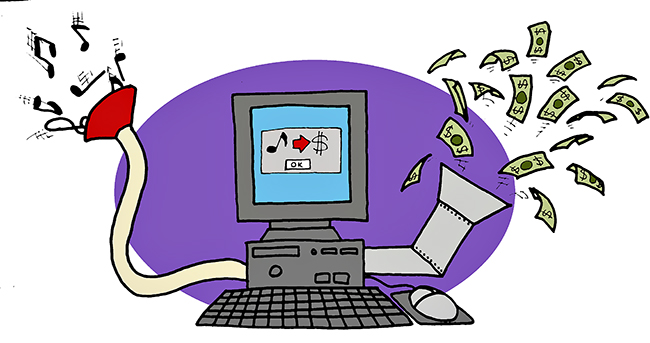Editor's Note: This column appears in a point-counterpoint regarding whether pulling music from streaming services is a beneficial practice. To find its counterpoint, click here.
Just one day before her album’s release, it was publicized that Adele’s 25 would not be available on streaming services Spotify and Apple Music. Although Adele has stayed silent on the reasons behind this decision, Taylor Swift, who pulled her music off last year, was vocal about her defiance towards online music streaming. Artists such as Swift would like you to believe this decision is in the best interest of the music industry as a whole, but they’re also hurting the relationship between fans, artists and the future of legal listening for personal economic gain.
The decision to hold music from streaming services reflects a history of problems in music consumption. Total album sales have decreased since 2005, according to data from Nielsen SoundScan. As more individuals gained access to high-speed Internet and more file sharing services surfaced, piracy became a prominent, and illegal, way to obtain music.
To combat this, streaming services emerged as a way for users to listen through one of two models — free, ad-supported versions or paid subscriptions. These services meet fans and artists halfway by giving fans cheap access and artists royalties per listen. The model is still growing, but in order to be successful, artists must cooperate.
Swift attracted attention when she suddenly pulled her discography off of Spotify last year. In an op-ed for the Wall Street Journal, Swift said she feels that Spotify devalues an artist’s work by not compensating musicians enough.
“Music is art, and art is important and rare,” Swift said. “Important, rare things are valuable. Valuable things should be paid for.”
While Spotify royalties are likely too low, Swift’s paint-by-numbers argument views the ethics of artist compensation in only a monetary sense. Swift needs to remember that even though she’s reached the status of a pop icon, she can’t possibly understand the majority of artists less famous than her. Many artists, who don’t come close to Swift’s $80 million a year, simply use Spotify as a way for users to discover their music or hear an artist’s message. After all, earning a living, or a fortune, doesn’t have to be an artist’s main reason for making music.
Still, profits from album sales were never the only way to bring in profit. Concerts, merchandise and licensing deals provide promising gains, and streaming services help artists get these opportunities by increasing exposure. When combined with streaming revenue, artists can make an income with a diverse range of methods.
Music streaming services need to become ubiquitous in order to attract higher-earning ads and justify paid subscriptions. In a global society where piracy is so prevalent, music streaming will lead the way for legal consumption if artists put up with the services’ shaky start.
Chan is a journalism freshman from Sugar Land. Follow him on Twitter @BenroyChan.





















